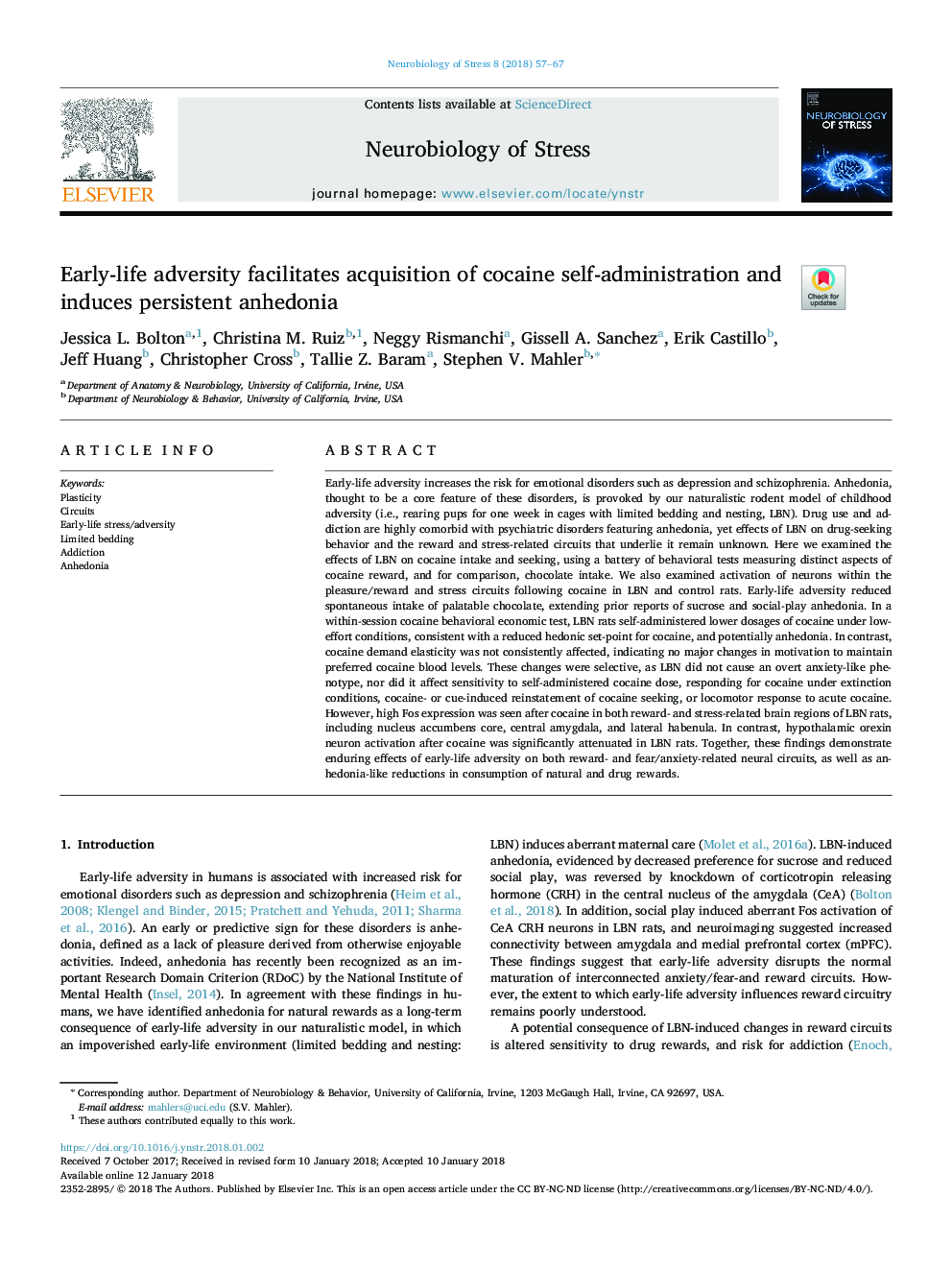| کد مقاله | کد نشریه | سال انتشار | مقاله انگلیسی | نسخه تمام متن |
|---|---|---|---|---|
| 8838724 | 1613191 | 2018 | 11 صفحه PDF | دانلود رایگان |
عنوان انگلیسی مقاله ISI
Early-life adversity facilitates acquisition of cocaine self-administration and induces persistent anhedonia
ترجمه فارسی عنوان
نارسایی زودهنگام موجب دستیابی به خودکشی کوکائین می شود و باعث ایجاد اندانیایی مداوم می شود
دانلود مقاله + سفارش ترجمه
دانلود مقاله ISI انگلیسی
رایگان برای ایرانیان
موضوعات مرتبط
علوم زیستی و بیوفناوری
علم عصب شناسی
علوم اعصاب رفتاری
چکیده انگلیسی
Early-life adversity increases the risk for emotional disorders such as depression and schizophrenia. Anhedonia, thought to be a core feature of these disorders, is provoked by our naturalistic rodent model of childhood adversity (i.e., rearing pups for one week in cages with limited bedding and nesting, LBN). Drug use and addiction are highly comorbid with psychiatric disorders featuring anhedonia, yet effects of LBN on drug-seeking behavior and the reward and stress-related circuits that underlie it remain unknown. Here we examined the effects of LBN on cocaine intake and seeking, using a battery of behavioral tests measuring distinct aspects of cocaine reward, and for comparison, chocolate intake. We also examined activation of neurons within the pleasure/reward and stress circuits following cocaine in LBN and control rats. Early-life adversity reduced spontaneous intake of palatable chocolate, extending prior reports of sucrose and social-play anhedonia. In a within-session cocaine behavioral economic test, LBN rats self-administered lower dosages of cocaine under low-effort conditions, consistent with a reduced hedonic set-point for cocaine, and potentially anhedonia. In contrast, cocaine demand elasticity was not consistently affected, indicating no major changes in motivation to maintain preferred cocaine blood levels. These changes were selective, as LBN did not cause an overt anxiety-like phenotype, nor did it affect sensitivity to self-administered cocaine dose, responding for cocaine under extinction conditions, cocaine- or cue-induced reinstatement of cocaine seeking, or locomotor response to acute cocaine. However, high Fos expression was seen after cocaine in both reward- and stress-related brain regions of LBN rats, including nucleus accumbens core, central amygdala, and lateral habenula. In contrast, hypothalamic orexin neuron activation after cocaine was significantly attenuated in LBN rats. Together, these findings demonstrate enduring effects of early-life adversity on both reward- and fear/anxiety-related neural circuits, as well as anhedonia-like reductions in consumption of natural and drug rewards.
ناشر
Database: Elsevier - ScienceDirect (ساینس دایرکت)
Journal: Neurobiology of Stress - Volume 8, February 2018, Pages 57-67
Journal: Neurobiology of Stress - Volume 8, February 2018, Pages 57-67
نویسندگان
Jessica L. Bolton, Christina M. Ruiz, Neggy Rismanchi, Gissell A. Sanchez, Erik Castillo, Jeff Huang, Christopher Cross, Tallie Z. Baram, Stephen V. Mahler,
